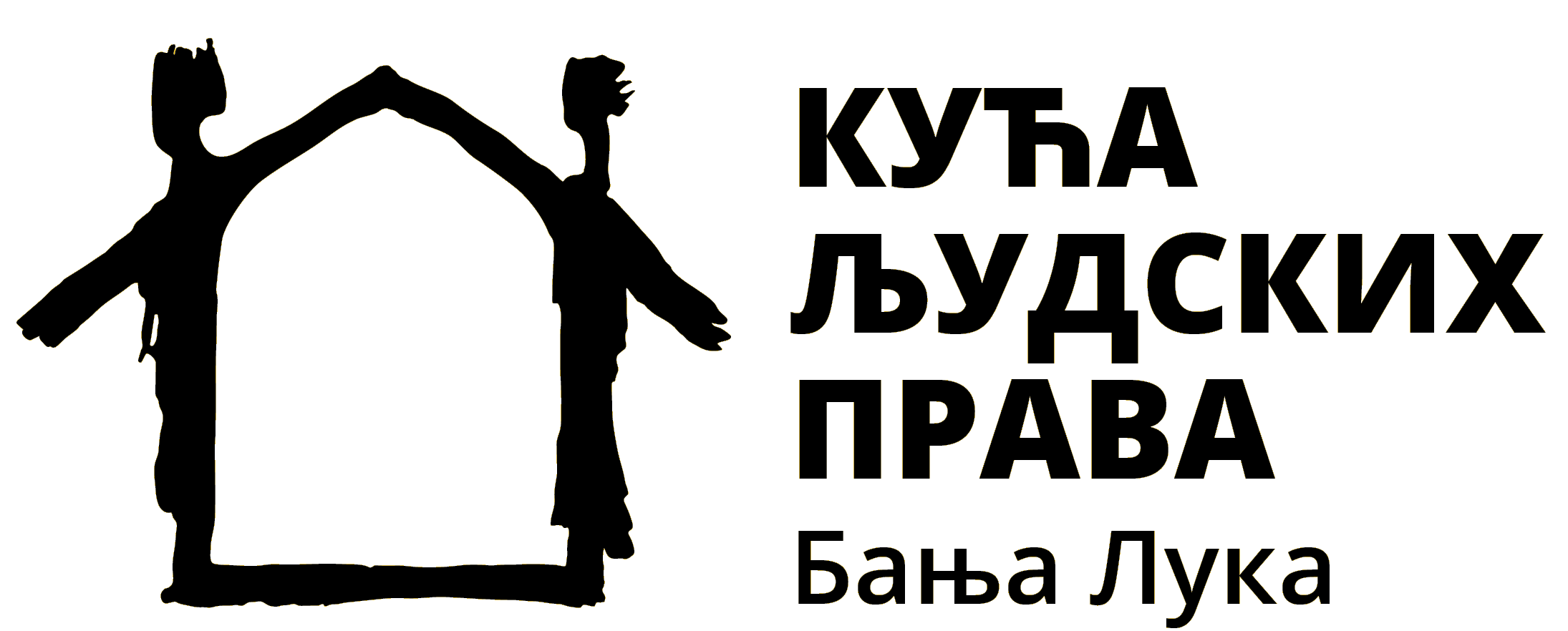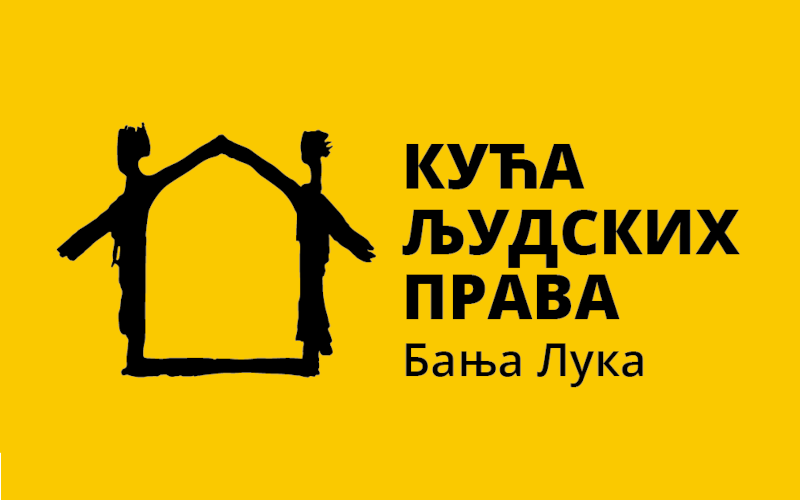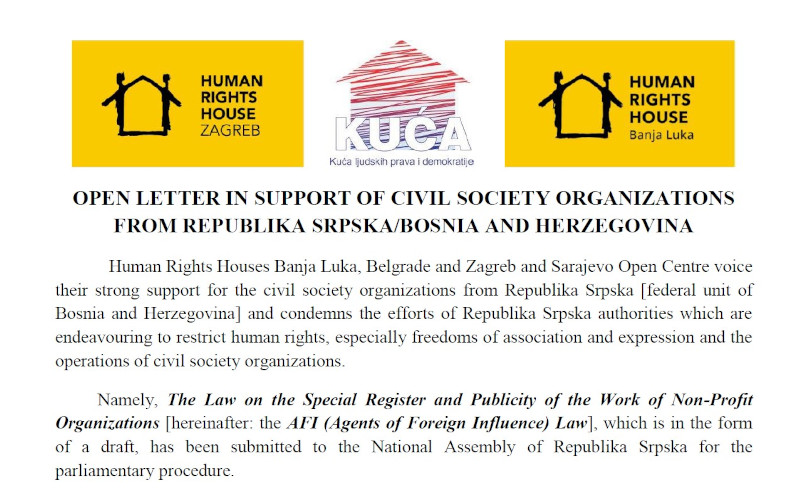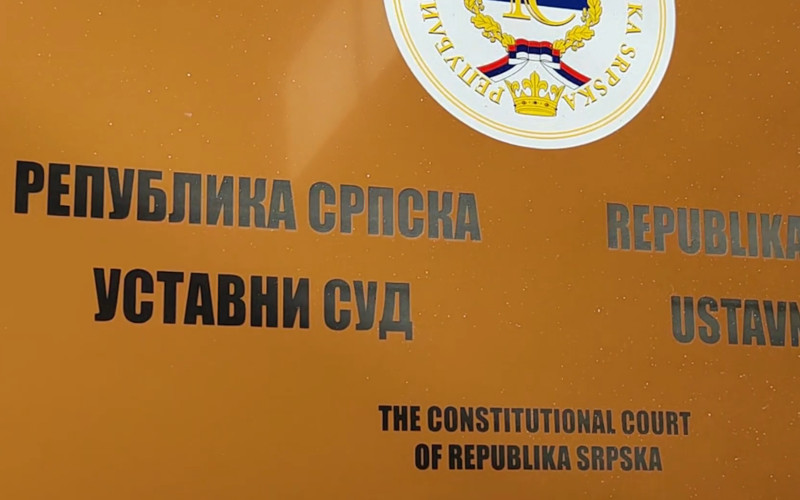Protests or demonstrations are usually public expressions of objection, disapproval, or disagreement with an idea, action, or inaction.
As such, they are protected by freedom of assembly, which is one of the basic human rights. This freedom is protected by the Constitution of Republic of Srpska and the Constitution of Bosnia and Herzegovina, as well as by international acts such as the Convention for the Protection of Human Rights and Fundamental Freedoms, the International Covenant on Civil and Political Rights or the Universal Declaration of Human Rights.
As the Institution of Ombudsman says in its Report, freedom of assembly is a basic human right that can be enjoyed independently or as part of a group, registered and unregistered associations, legal entities and others. Assembly can serve many purposes, including the expression of different, unpopular, or minority views or opinions.
So, the most important thing is that everyone has the right to freedom of peaceful assembly! However, this is not an absolute right. Thus, no restrictions may be placed on this right, except those, such as states the European Convention, which are prescribed by law and necessary in a democratic society in the interest of national security or public safety, to prevent disorder or crime, to protect health or morals, or to protect the rights and freedoms of others.
So how is a protest organized in Republic of Srpska?
Public assemblies are regulated primarily by the Law on Public Assembly of the Republic of Srpska from 2008. This law regulated public assemblies of citizens for the purpose of public expression of political, social and other beliefs and interests, the way of organizing peaceful assemblies and public protests and other public gatherings.
What is an “appropriate space” for holding assembly?
The law considers a public assembly as any organized gathering of citizens that takes place in an appropriate space.
A space that is appropriate for a public assembly is any public place that is accessible and suitable for the assembly of persons whose number and identity are not determined in advance and where the assembly of citizens does not endanger the rights of other persons, public morals, the safety of people and property, the health of people and disruption of public traffic.
A space appropriate for a public assembly is also a space where public traffic takes place when it is possible to provide temporary changes to the traffic regime with additional measures, as well as the protection of health and safety of people and property.
The city and the municipality determine specifically which space it is.
Citizens can also organize a public assembly in motion, which takes place as the movement of participants in a public assembly in a certain area.
Stating and encouraging the use of violence, as well as national, racial, religious or other hatred or intolerance, is prohibited at public assembly.
Peaceful assemblies can be organized by legal or physical entities, and when the assembly is organized by a group of citizens or several legal entities, the organizer is obliged to designate a representative.
In which area a protest cannot be held?
Peaceful assembly is not permitted by law to be held in certain areas. Thus, the assembly must not be hold:
- near hospitals, in a way that obstructs the access of emergency vehicles;
- near kindergartens and elementary schools, while children stay in them;
- in national parks and protected nature parks, except for peaceful assemblies aimed at popularizing the protection of nature and the human environment, as well as marking important historical dates;
- near cultural monuments, if this could cause the destruction or damage of protected value;
- on main, regional and local roads in a way that endangers traffic safety;
- near facilities that are specially secured at a distance of at least 50 meters from them.
Registration to hold an assembly
The law stipulates that registration is required to hold a peaceful assembly.
The organizer, or its representative, is obliged to submit the registration no later than five days before the start of the peaceful assembly.
The registration is submitted to the Ministry of Internal Affairs of the Republic of Srpska – the organizational unit on which territory the peaceful assembly is intended to be held.
However, it is extremely permissible, for particularly justified reasons, to submit the registration no later than 48 hours before the start of the peaceful assembly, with an explanation for not registering within the deadline.
The registration for holding an assembly should contain certain elements. These elements are:
- the program and goal of the peaceful assembly;
- information on the place and time of the assembly and its duration;
- estimation of the number of participants;
- information about the organizer or his/her representative;
- personal data of the leader of the peaceful assembly;
- information on the measures taken by the organizer to maintain peace and order;
- list of orderlies with their personal data.
When it comes to the registration of a peaceful assembly on the move, it should also contain a detailed route of movement, place of departure and place of end, as well as the way of movement of the participants (on foot, by vehicle, combined).
If the peaceful assembly also involves the road surface, which would cause traffic to be suspended or obstructed, the organizer is obliged to attach the approval of the competent authority in accordance with the Law on the Basics of Road Traffic Safety in BiH.
What if assembly is prohibited?
The Ministry of Internal Affairs can, by decision, prohibit the holding of a peaceful assembly, if:
- is aimed at endangering the order established by the Constitution;
- it was not registered in a timely and proper manner;
- is registered in areas where, in accordance with the law, it cannot be hold;
- the goals are indisputably aimed at violating guaranteed freedoms and human rights or may encourage violence due to different national, racial, religious or cultural feelings and affiliations;
- there is a real danger that by holding a peaceful assembly, the safety of people and property would be endangered or there would be a serious danger of violence or a large-scale disturbance of public order and peace;
- it is necessary to prevent endangerment of people’s health, at the request of the state administration authority competent for health affairs.
This decision must be made no later than 24 hours before the announced start of the peaceful assembly.
Against this decision, the organizer can file an appeal, which the competent authority (Ministry of Internal Affairs of the Republic of Srpska – the organizational unit on which territory the peaceful gathering is intended to be held) is obliged to immediately submit with the documents to the Minister of Internal Affairs of the Republic of Srpska.
However, this appeal does not delay the execution of the decision.
The decision on the appeal must be made and delivered to the organizer no later than 24 hours after receiving the appeal. However, if the minister does not decide on the appeal within the specified period, a peaceful assembly can be held.
An administrative dispute may be initiated against this decision before the competent court.
Obligations of organizers and participants of assemblies
The organizer of the assembly has certain obligations in connection with it. Thus, he/she is obliged to ensure order and peace at a peaceful assembly. In addition, the duty of the organizer is to provide a sufficient number of orderlies, i.e. persons to perform tasks of maintaining order and peace at a peaceful assembly and to take appropriate measures of medical protection and fire protection.
The organizer can entrust the performance of work on maintaining order and peace to an agency for the security of persons and property.
Also, the organizer is obliged to allow the unhindered passage of police, ambulances and fire engines vehicles.
Participants of a peaceful assembly are prohibited from bringing in alcoholic drinks and carrying objects suitable for causing injuries. In addition, the participants of a peaceful assembly must not wear uniforms, parts of uniforms, clothes or other signs that call for or encourage armed conflicts or the use of violence, national, racial, religious or other hatred or intolerance.
Assembly leader and orderlies
The organizer is obliged to appoint a leader of the peaceful assembly who will supervise the maintenance of the peaceful assembly and direct the work of the orderlies.
The organizer appoints an orderly who performs tasks of maintaining peace and order at a peaceful assembly. During the performance of orderly duties, the orderly is obliged to wear a vest of fluorescent color with the visible inscription “ORDERLY”.
The orderly is obliged to protect the participants of the peaceful assembly and the property located in the area where the peaceful assembly is being held during the execution of the duties of the orderly. It is also the duty of the orderly to immediately inform the authorized official of the competent body about the participant of a peaceful assembly who is carrying a weapon or objects suitable for causing injury. Also, the orderly is obliged to provide the authorized person with information about the person who violated order and peace.
The orderly should also inspect the person entering the area where the peaceful assembly is held, direct the movement of the participants in the peaceful assembly and inform the authorized official of the competent body about the participant of the peaceful assembly who, in his/her opinion, is in an intoxicated state, carrying objects suitable for causing injuries or may disturb the peace and order of a peaceful assembly.
When the assembly can be interrupted
Authorized officials of the competent authority are authorized by law to prevent or interrupt a peaceful assembly, if:
- is aimed at endangering the order established by the Constitution;
- the participants state or encourage armed conflict or violence, national, racial, religious or other hatred or intolerance;
- there is a real and direct danger of violence or other forms of disruption of public order and peace on a larger scale;
- there is a real or direct danger to the health of participants or other people;
- its maintenance is not registered or is prohibited;
- is held in a place that is not specified in the registration;
- orderlies cannot maintain order and peace.
The authorized official of the competent authority should communicate the order to stop the peaceful assembly to the leader of the peaceful assembly.
The leader of the peaceful assembly is then obliged to inform the participants of the peaceful assembly that the peaceful assembly has been interrupted and to ask them to walk away peacefully.
Excessive restrictiveness of the law
The existing Law on Public Assembly is too restrictive and does not define the freedom of assembly in the best way, as it should be framed in accordance with international human rights standards.
It is absolutely clear that in the behavior of institutions and competent persons towards citizens who want to gather, international legal standards must be respected. Thus, the term “spontaneous assembly” does not currently exist in the existing law, and e.g. according to the Guidelines related to freedom of assembly published by the Office for Democratic Institutions and Human Rights of the Organization for Security and Cooperation in Europe (OSCE) and the Venice Commission, as long as assemblies are peaceful, their prohibition or interruption should not occur, even if was not reported, because it represents a disproportionate interference with the freedom of assembly.
Therefore, even if the report does not occur in certain cases, if the assembly is peaceful and there is no threat to public safety, the police should not prevent it or “break it up”, thus respecting democratic international legal standards.
Also, in the case of Bukta and others v. Hungary, the European Court of Human Rights stated that in certain cases assemblies should not be restricted, as long as no illegal activities are taking place there, even when no notification is sent to the competent authorities that assembly will be hold.
In addition, “advance notice” of the protest should be sent to the relevant authorities to enable them to allow the assembly to be hold. Therefore, it would be good to ensure that the understanding of the term “registration” refers to the notification system, and not to the approval of assembly. As stated by the ombudsmen in their recommendations, it is necessary that there be a presumption in favor of holding the assembly, so what is not prohibited should be considered permitted.
And just asking the organizers of public assemblies that the “registration” contains detailed information about the assembly is too restrictive and is not needed in a democratic society, as it burdens the organizer too much with things that he/she may not be able to fulfill, and in addition, it can also deter the organizers from holding a peaceful assembly. The United Nations Special Rapporteur on Freedom of Assembly expressed his position in this regard and stated that the organizer’s notification should not include any additional information other than the date, time, duration and location of the assembly, and the name and contact information of the organizer.
Asking the organizers of assembly to take measures to ensure public order and peace is also problematic, as they practically transfer the responsibility for law enforcement to them. The responsibility regarding the provision of public order and peace certainly rests with the competent authorities, and not with the person who organizes the assembly.
When it comes to restrictions on free assembly, they must be proportionate, and the state should use the mildest measure to achieve a legitimate goal. Thus, assemblies should not be restricted based on minor problems related to them, but only in cases of serious violations of the law.
It is important to note that no criticism of the government or the actions of civil servants should ever be a sufficient basis for imposing restrictions on the freedom of peaceful assembly. Namely, the limits of admissible criticism are much wider when it comes to criticism of the government than in relation to a private citizen.
In general, in the Law on Public Assembly of the Republic of Srpska, it is necessary to simplify the registration procedures in order to introduce good practices and recommendations of international bodies, as well as to amend all relevant provisions in order to create a good framework for free assemblies.
Sources; For more information see:
Constitution of Bosnia and Herzegovina – Annex IV of the General Framework Agreement for Peace in Bosnia and Herzegovina, [negotiations started in Dayton on November 21, 1995, and the agreement was signed in Paris on December 14, 1995]
Constitution of Republic of Srpska, [Official Gazette of the Republic of Srpska, numbers 21/1992, 28/1994, 8/1996, 13/1996, 15/1996, 16/1996, 21/1996, 21/2002, 31/2002, 31/2003, 98/2003 and 115/2005]
Law on Public Assembly of the Republic of Srpska, [Official Gazette of the Republic of Srpska, number 118/2008]
The Law on the Basics of Road Traffic Safety in Bosnia and Herzegovina, [Official Gazette of Bosnia and Herzegovina, numbers 6/2006, 75/2006, 44/2007, 84/2009, 48/2010, 48/2010, 18/2013, 8/2017, 89/2017 and 9/2018]
Convention for the Protection of Human Rights and Fundamental Freedoms [Council of Europe, European Treaty Series Nos. 005, 009, 044, 045, 046, 055, 114, 117, 118, 140, 146, 155, 177, 187, 194, 204, 213 and 214]
Universal Declaration of Human Rights, United Nations General Assembly, [A/RES/217, 1948]
International Covenant on Civil and Political Rights, [United Nations General Assembly, 2200A (XXI), 1966, Treaty Series, vol. 999]
Report of the Special Rapporteur on the Rights to Freedom of Peaceful Assembly and of Association, Maina Kiai, [A/HRC/23/39]
Freedom of Religion or Belief and Security: Policy Guidelines, [ОSCE/ОDIHR: 2019]
Guidelines on Freedom of Peaceful Assembly, [OSCE/ODIHR, Warsaw: 2010]
Special Report on the Right to Freedom of Peaceful Assembly, [Institution of Ombudsman/ Human Rights Ombudsman of Bosnia and Herzegovina, Banja Luka: 2020]
Bukta and Others v. Hungary, [Application no. 25691/04, 17 July 2007]
The text was created thanks to the support of the European Endowment for Democracy.
Cover photo: Протести, [Аuthors: Слађан Томић/Дејан Лучка]
The text was downloaded from the website of Dejan Lučka on the following address: https://dejanlucka.com/kako-da-organizujes-protest-u-skladu-sa-pravom/



